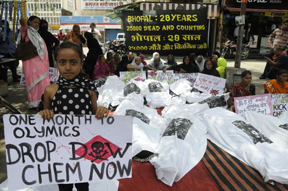 NEW YORK: In a major blow to victims of the 1984 Bhopal gas tragedy, a US court here has ruled that the Union Carbide Corporation (UCC) cannot be sued for the ongoing contamination from the chemical plant.
NEW YORK: In a major blow to victims of the 1984 Bhopal gas tragedy, a US court here has ruled that the Union Carbide Corporation (UCC) cannot be sued for the ongoing contamination from the chemical plant.
Nongovernmental organization EarthRights International had filed the lawsuit in the Southern District of New York on behalf of residents of Bhopal saying land and water of the citizens are being contaminated by waste from the plant.
EarthRights said that as per the court’s ruling, Union Carbide cannot be sued despite evidence that construction of the plant was managed by an employee of the company.
EarthRights expressed confidence that there is enough evidence against Union Carbide that will lead to a reversal of the “erroneous decision on appeal”.
The lawsuit had also added the state of Madhya Pradesh, which owns the site of the former Bhopal plant, as a defendant and had sought that Madhya Pradesh also cooperate in clean-up of the site.
US District Judge John Kennan said in his 45-page ruling on July 30 that, “The only relief plaintiffs seek against Madhya Pradesh is an injunction directing them to cooperate in clean-up of the site ordered by this Court against UCC.
“Because I conclude that there is no basis to hold UCC liable for Plaintiffs’ damage, there will be no court-ordered cleanup in this action, and thus, no basis for enjoining Madhya Pradesh. It is therefore appropriate to enter judgment in favor of the state (in) the amended complaint,” the judge said in his ruling.
A poisonous gas leak from the Union Carbide plant killed over 5,000 people on the night of December 2-3, 1984 and EarthRights said UCC had “largely abandoned” the site, allowing toxic wastes to seep into the local water supply.
It said UCC was involved in the creation and disposal of toxic wastes at the Bhopal plant, and the manager who oversaw the construction of the plant confirmed that he worked for UCC, not for the Indian subsidiary that officially operated the plant.
Keenan, however, ignored this evidence and ruled that UCC was not sufficiently involved in the acts at the plant and that the project manager actually worked for the subsidiary, EarthRights said in a statement. “The evidence demonstrates that Union Carbide was intimately involved in every aspect of designing and building the Bhopal plant, including the waste disposal systems that caused the pollution,” counsel for the plaintiffs and Legal Director for EarthRights Marco Simons said.
“The court’s decision discounted this evidence, and it depends entirely on assuming that the manager who oversaw the construction of the Bhopal plant – who said he worked for Union Carbide – didn’t really know who he worked for,” he said.
The Second Circuit Court of Appeals, which will hear the plaintiffs’ appeal, had previously reversed several prior dismissals of cases against UCC.
EarthRights expressed hope that the appeals court will “correct this error”.
Co-counsel Rajan Sharma, of the New York law firm Sharma & DeYoung, added, “These families have been living with Union Carbide pollution for decades. We remain committed to seeking the justice that they deserve”.
The plaintiffs have also sued Madhya Pradesh to compel its cooperation in the cleanup of the contamination.–PTI






